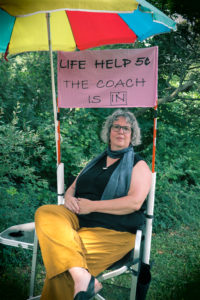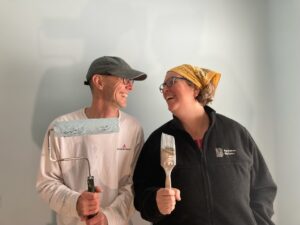“Transformation is like peeling layers of an onion, removing layer after layer of cultural, familial, and life lessons that do not serve our wholeness. Some of the layers are big, like a career or a relationship change. Most of them are smaller, slower learnings that happen throughout our lives, and hopefully never stop.“
Jill Terwilliger is a professional coach from Kalamazoo who shares her expertise through life coaching, leadership training, and helping others navigate new pathways to personal happiness and success. In her previous life, she fulfilled roles as a minister, hospice chaplain, and (before her transformation), an unhappy stay-at-home mom.
Jill met Balodana’s founder Dana through an online community for women over 40, Revel, where women often share their journeys. It’s not uncommon to hear about women making changes to their personal happiness formulas in midlife, as they start to question their roles in society, family, business, and universe. While we hear more about radical transformations (often physical or financial) in the media, it’s often these personal transformations that can be most inspiring because they are so relatable. To move from pain to joy seems obvious and small as a change, but when you are living in it day to day it can seem like a mountain to climb.
Recently, Jill was gracious enough to share her story with us.
Balodana: What was the catalyst for your transformation experience?
Jill: There are so many catalysts from my life to choose from, but the biggest I think would have to be my divorce. I met my husband when we were in grad school. By the time of our divorce we were together for 20 years and had a middle-school aged child. We’d been through a lot together.
There were good things in the relationship, but they were always overshadowed by an air of dissatisfaction. There was no explosive moment where I knew it was over, but nothing had really prepared me for the impact that gaslighting would have on me. There was nothing intentional or dramatic about it; he just never believed me as an authority on anything. He never took me seriously, so it was hard to take myself seriously. I came to believe that I was “too emotional,” instead of learning emotions are signals that are telling me things.
About two years before divorcing, we were on a family trip to Canada. We were canoeing up a river together toward the ocean. I had grown up canoeing, and fast moving water is my comfort zone. I understand paddling and rough water, and that calmer water can be more dangerous. We came to a place where I wanted to turn around. I could see all the signs clearly that things weren’t safe, and we had our young child with us. But despite my experience, my husband insisted on pushing forward and put us in a dangerous predicament.
Nothing bad happened, thankfully, but my husband’s refusal to accept my authority on the subject put us all at risk. I thought to myself, “Wait, I know I know this thing.” It was an extreme example of how he regarded me throughout our relationship, and that was the beginning of the end for me.
After that, I felt stuck, and I was becoming more and more depressed, so I sought answers to my dissatisfaction in therapy and self-help techniques. Some of the psychology I used to try and understand myself led to even more depression. I was still so unhappy and nothing made it go away for long. Really I was desperately trying to find gratitude in my life, something that I couldn’t do while I was married.
I realized I was continuing a pattern of finding things that you’re supposed to thrive in and discovering that they did not fit for me. It’s something that looks great from the outside, while inside you’re telling yourself, “This doesn’t work, I feel terrible.” For example, before I was married I went to a great college in Appleton, WI, but I struggled. After just two years, I left. I ended up at a Catholic school where I could finally thrive, and that enabled me to discover I had intellectual capabilities I did not know I had.
A full time schedule never worked for me either. I was a Unitarian Universalist minister in Kalamazoo then became a hospice chaplain before deciding to stay home with my daughter. After my marriage ended, I did not want to go back into ministry. I worked for the Big Brothers Big Sisters organization before the pandemic, but it wasn’t me.
Then I started life coach training. It pulled together and gave certification to all that I had learned and experienced, like learning to listen to myself, and trusting the things my mind and body are telling me.
Balodana: How did your transformation affect the people around you?
Guest: My daughter was the most affected by the divorce. She was 11 at the time. It was clearly hard and upsetting for her to have her family divided, but I had a lot of understanding about how to talk to her. I was 9 when my own parents separated. My ex and I remained committed to maintaining our relationships with her. Within 6 months, she was able to see I was a happier person.
Following the divorce, I met someone new rather quickly and unexpectedly. The new relationship was consuming and distracting, but my daughter could see how happy I was. Three years ago he moved in with us, and she wasn’t thrilled at first. Now they get along very well. She has said that of all the adults in her life, ours is the relationship that she likes the most. I feel lucky to be able to show her that a healthy relationship is possible and that you don’t have to settle for something less.
Balodana: What was the most difficult or memorable part of your transformation?
Jill: The hardest part was realizing there was the possibility of something different, and knowing if I kept doing what I was doing then it wasn’t going to change.
At one point, when we were still trying to save our marriage, my husband and I both agreed to read the Love Languages book. He was going on a trip, and we made plans to discuss it when he came home. The book helped me realize that I had been asking for what I needed all along and he was just not responding.
When he returned right before Valentine’s Day, I said, “I am done.” His response was, “I think you’re right and I never had the guts to say it.” He was out of the house a week later.
Balodana: Did your personal style or wardrobe change to reflect your transformation?
Jill: A big part of my fashion journey has been accepting my body and finding clothing that works for my shape. I am also slowly reclaiming playfulness and color in my wardrobe. I really love black and gray, more neutral colors, but I am playing more with pops of colors, like big colorful earrings. They make me feel powerful!
Balodana: What piece of clothing do you find most empowering?
Guest: Other than a great pair of earrings? My black tank top is the shirt I want to wear all the time because it fits my body perfectly. It’s amazing how empowering it is to own a piece that fits so right.
Also, having a partner and a friend group that are body positive and love me the way I am has been immensely satisfying. I remember a moment when my current partner reached over and touched my hip casually and said, “You feel NICE.” Nobody had ever told me that softness in my body could be nice, that I can CLAIM that. I look great because I am confident.
Balodana: What would you say for others who may be having a hard time adapting to changes and/or opportunities?
Jill: One question that I encourage my clients to ask themselves is this: can I live into the wholeness of myself in this relationship/job/family/community? We all have it in us to create the life that will bring us fulfillment. It’s not easy to find the core of that wisdom, but nothing different is going to happen if you don’t make a change.
I also suggest asking, “What’s available right here that is not available at other times? How can I lean into that in a difficult situation and change my perception?” The followup question to all of this is “How do I create a space where I can be whole?” This is a question that can bring clarity.

Balodana: Tell us a little bit about Anbau Coaching and the work that you do.
Jill: The name of my coaching and consulting business is Anbau. Anbau means “to cultivate” in German. A lot of people in my line of work use phrases like transforming or finding peace, but I believe I can help you cultivate what you already have inside you.
I offer one-on-one coaching and leadership coaching, to both individuals and organizations. My current passion project is “The Coach Is In.” Think about it like the classic Peanuts cartoon with Lucy seated under the sign, offering advice.
Recently, I went to an art fair in Kalamazoo and for three hours I coached people right on the street. People approached me with the most personal things they are struggling with and shared their vulnerability in public. People are desperate to connect to other people right now, to be heard and to learn how to tap into their own resources. Now I want to bring that chair into businesses.
I’ve also been hosting what I call Influx Groups, which are essentially group coaching sessions paired with reading and listening discussions and between session practices.
Every person in the group is instructed to write a “I want more ____ in my life” statement at the start to build on throughout the process. New topics are introduced every month, which they can then apply to what they want in their life. We will cover subjects such as loss and grief, body acceptance and positivity etc.

Art is another big part of my life, and my schedule has enabled me to enjoy creating, exploring, and participating in my community. Two days a week I help with my partner’s business, which involves a very satisfying “progress and transformation” in the form of painting home interiors. I find it very gratifying to be part of changes that happen so quickly. One of my more recent art projects was the creation of screen printed “picnic prints,” which I created by hand screen printing the cross sections of vegetables (Jill’s featured photo shows a sample of her artwork). I love looking at nature motifs. It’s the most amazing beauty in the world, discovering the patterns inside.
Links:
https://www.linkedin.com/in/jill-terwilliger-860917177
——-
One of Balodana’s core values is celebrating all of life’s stages, ups and downs, triumphs and tragedies. With this series of interviews with powerful people who have gone through a transformative experience, we hope to inspire you and energize you through your own transformation. If you know someone who has a great transformation story to tell, nominate them! Send to inquiries@balodana.com.
